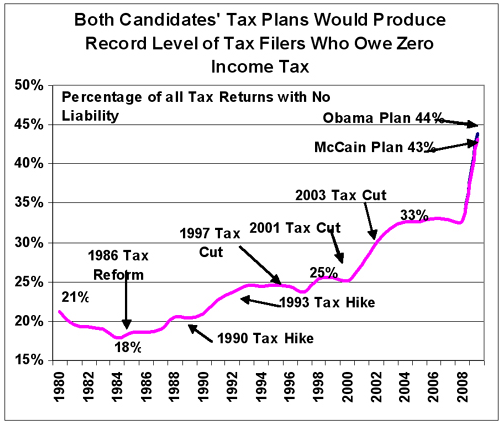« Reading List: De Havilland Comet |
Main
| Reading List: Empire of Lies »
Wednesday, October 22, 2008
Gnome-o-gram: Tipping Point
A democracy cannot exist as a permanent form of government. It can only exist until the voters discover that they can vote themselves largesse from the public treasury.
— Source unknown, variously attributed
What is the tipping point at which the voters can be deemed to have made the disastrous discovery cited above, and a democratic polity begins its unrecoverable spiral into a state in which a dependent majority loots a shrinking productive minority, with the ultimately tragic consequences demonstrated with such dismaying frequency in history? Well, let's look at the following graph of the situation in the United States.

Graphic by the Tax Foundation
This chart shows the percentage of all individual income tax returns with no tax liability due from 1980 through the present, extrapolated to 2009 according to the announced McCain and Obama tax plans (which, by this measure, have almost identical effects, although they differ in many details). While for most of this period, only about one in four or five filers owed no Federal income tax, this figure jumped to one in three after the Bush tax cuts of 2001 and 2003, and appears to be poised to soar to slightly less than half under either an Obama or McCain administration.
I would define the crucial figure on this chart as the 50% level, and the U.S. appears to be on the verge of reaching it. Beyond that point, there is an absolute majority (albeit measured in tax filers, which doesn't translate directly into numbers of voters) who pay no Federal income tax whatsoever, some of whom receive Federal money in the form of refundable tax credits (which both candidates have pledged to expand), and hence view any government expenditures which benefit them as without direct cost: they're paid for by the minority who actually pays taxes. This creates an incentive system dangerously tilted toward ever-expanding government benefits to the majority and an increasingly confiscatory regime for the dwindling and demoralised minority of actual taxpayers. Politicians who advocate tax cuts or broadening the tax base automatically restrict themselves to appealing to a minority, and that's something even politicians are rarely dumb enough to do.
Now, before everybody writes to point out that those who pay no income tax still pay other taxes, let me note that I'm perfectly aware of this. Employed taxpayers with no income tax liability still pay Social Security taxes (part of which is “paid” by their employers, which simply reduces their paychecks by an equivalent amount), and although there is at present no Federal sales tax in the United States, individuals ultimately pay the corporate income tax in the form of higher prices for goods and services passed on by firms subject to this tax. But since these taxes are (in the first case) not perceived as funding general government spending programs (even though, in fact, they do, but let's not get into that here) and (in the second case) hidden in the cost of goods and services, voters do not immediately connect them with their personal share of the cost of government.
Note that the chart above understates the constituency for government programs funded by those who actually pay taxes. Measuring just those tax filers with no tax liability excludes “net tax eaters” who have some tax liability but whose income from government payments of various kinds exceeds their tax liability. But even excluding people in this category, it's clear that the U.S. is on a course to come perilously close to tipping point where a majority of the electorate pays no federal income tax. How do you recover from that situation and its inevitable consequences? You don't, in a democracy.
Other gnome-o-grams
Posted at October 22, 2008 20:16
